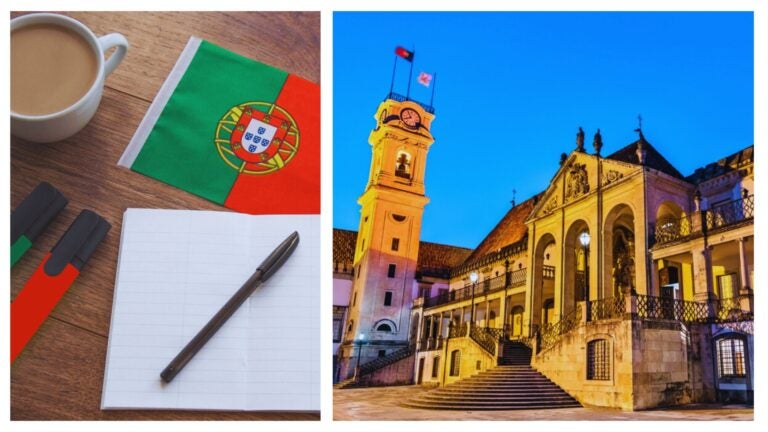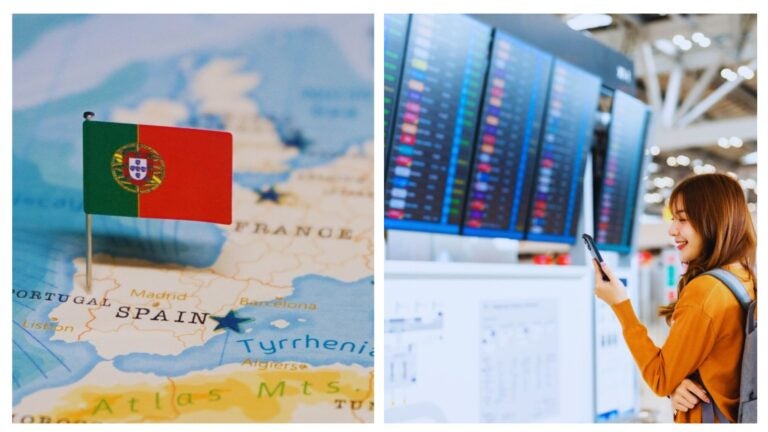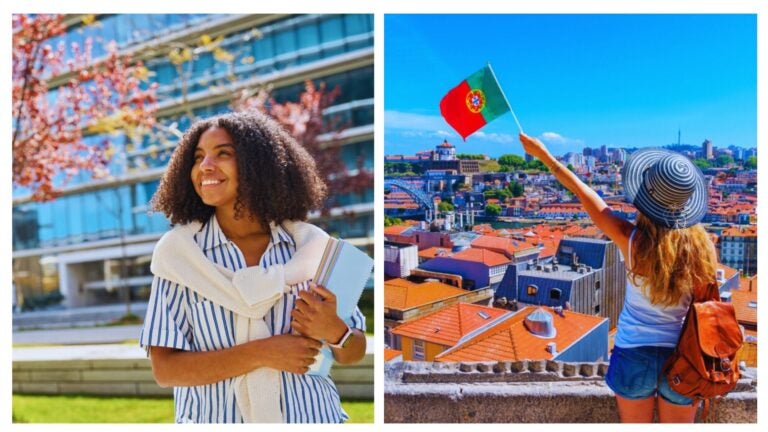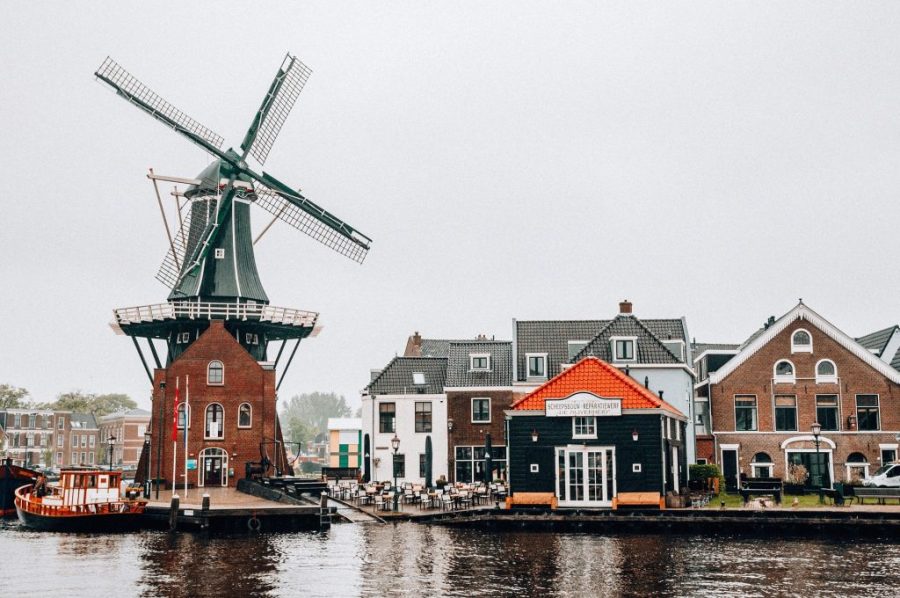Student visa for Portugal: Requirements & process
Make sure you know all the details about the student visa in Portugal, from the costs to the steps required to obtain it.
Portugal has become a favorite on the Iberian Peninsula for its excellent education and relatively low cost of living compared to much of Europe, attracting more international students every year. If you’ve just been accepted to a school or landed a scholarship here, congratulations! Now’s the moment to start getting your travel plans in order.
The first thing you’ll need is your Portuguese student visa. Wondering how long it lasts, what it costs, or how long it takes to get it? Here at Holafly we’ve put together this guide to walk you through the different visa options and every step of the application process. And while you’re at it, make sure you’ve got your internet sorted for your time in Portugal. Check out Holafly Plans, offering anywhere from 25 GB to unlimited data.
When do you need a student visa in Portugal?
Whether or not you need a student visa for Portugal depends on your nationality and how long you’ll be studying. Citizens of the European Union (EU), the European Economic Area (EEA), and Switzerland don’t need a visa for stays longer than 90 days, but they must register for a Registration Certificate (Certificado de Registo) at their local town hall within the first four months after arriving.
If you live outside the EU, EEA, or Switzerland, you’ll need a student visa to enroll in any academic program in Portugal. The exact type of visa you’ll need will depend on the length and nature of your course.
Types of student visas in Portugal
Short-stay visa (type C)
This visa is for students taking courses or study programs in Portugal that last no more than 90 days, such as summer courses, workshops, or short-term exchange programs. It does not allow you to work while you’re there.
Temporary stay visa
This visa is intended for students enrolled in programs lasting from three months to one year, such as academic exchanges, language courses, or professional certification programs. It also does not allow you to work while in Portugal.

Residence visa for studies (type D)
This visa is for students enrolled in long-term academic programs, such as bachelor’s, master’s, or doctoral degrees. It allows you to work in Portugal without hourly limits, as long as your job doesn’t interfere with your studies.
Benefits of visas for studying in Portugal
Having a student visa for Portugal opens the door to excellent education and brings plenty of perks that make your time studying and living there even more rewarding.
Type C visa: What is it for?
Advantages
- Access to short-term academic programs: Summer courses, specialized workshops, or short exchange programs.
- Cultural experience: Opportunity to learn about traditions, cuisine, and iconic locations in a short period of time.
- Ease of application process: As it is a visa for short stays, the requirements are usually less complex compared to long-term visas.
Temporary stay visa for students
Advantages
- Extended stay: Over 90 days and up to 12 months.
- Access to quality education: Such as language courses, exchange programs, or professional internships.
- Travel within the Schengen area: For up to 90 days every six months.
- Limited job opportunities: While the visa doesn’t allow paid work, some study programs may include unpaid internships that add valuable real-world experience.
Type D visa: What does it allow you to do in Portugal?
Advantages
- Work permit: Holders of this visa can work up to 20 hours a week during the school term and full-time during breaks, making it easier to gain work experience and earn some extra money.
- Access to health and education services: This visa gives you access to Portugal’s healthcare system and other public services to support your well-being while you’re there.
- Possibility of family reunification: In some cases, close family members like your spouse or children may be able to join you in Portugal, as long as you meet the requirements for family reunification.
- Mobility within the Schengen area: Travel freely between countries within this area.
- Renewal and extension of stay: If your program runs longer than expected, you can renew your residence permit so you can keep studying without any hassle.
Student visa requirements in Portugal: Are you eligible?

Temporary residence visa and type C visa
- Acceptance letter: From a recognized Portuguese educational institution.
- Valid passport: Must be valid for at least three months after the expected date of departure from Portugal and have at least one blank page.
- Financial means: You’ll need to prove you have enough funds to support yourself while in Portugal, which can be shown through recent bank statements or a sponsorship letter.
- Medical insurance: Have valid health insurance that covers any medical expenses during your stay.
- Accommodation: Provide proof of accommodation in Portugal, such as a hotel reservation or a letter of invitation.
Type D residence visa
- Acceptance letter: Submit an official letter of acceptance from a Portuguese university or educational institution.
- Valid passport: Your passport should be valid for at least three months beyond the length of your visa and have enough blank pages.
- Financial resources: You’ll need to show you can cover your tuition, living expenses, and accommodation while in Portugal, which can be proven with bank statements, scholarships, or sponsorship letters.
- Medical insurance: Must cover you the entire duration of your stay in Portugal.
- Criminal record: A clean criminal record certificate issued by the authorities in your country of origin must be provided.
- Accommodation: You’ll need to provide proof of accommodation in Portugal, such as a lease agreement or a letter from your school confirming housing arrangements.
- Application form: Complete and sign the relevant visa application form, available from the Portuguese embassy or consulate in your country.
How to apply for a student visa in Portugal?
Applying for a student visa in Portugal involves a few important steps. One of the most crucial is making sure you submit the right documents based on the type of visa you’re applying for. Take a look and make sure you’ve got everything covered:
| Temporary stay visa | Type C visa | Type D visa |
| Completed and signed application form. | Application form, available at the Portuguese embassy or consulate in your country. | Application form. |
| Passport valid for at least three months after the planned date of departure from Portugal. | Photographs: Passport size, in color, with a white background. | Photographs: Passport size, in color, with a white background. |
| Two recent passport-style photographs. | Valid passport: Original and copy of the relevant pages of your passport. | Valid passport |
| Health insurance valid in Portugal for primary care and emergencies. | Acceptance letter from the institution. | Acceptance letter from the institution. |
| Criminal record. | Proof of financial means: Recent bank statements, sponsorship letter, or evidence of scholarship. | Proof of financial solvency. |
| Acceptance letter. | Medical insurance covering medical expenses and repatriation. | Criminal record certificate issued by the competent authorities in your country of origin. |
| Proof of financial means. | Travel itinerary: Round-trip flight reservations and accommodation details. | International medical insurance. |
| Proof of accommodation. | Proof of payment of fees. | Proof of accommodation |
| Proof of payment of fees. | Proof of payment of fees. |
Interviews and questions
Sometimes, consular officers might ask for an in-person interview as part of your visa application. During the interview, they may ask questions about:
- Academic motivation: Reasons for choosing Portugal and the specific institution for your studies.
- Study plan: Details about the academic program you plan to pursue and how it relates to your professional goals.
- Financial resources: How do you plan to finance your stay and studies in Portugal
- Post-study intentions: Your plans after completing your studies, whether that be returning to your home country.
Where to apply for a student visa in Portugal?

When applying for a student visa in Portugal, it’s key to know the best way to get the process started. Make sure to apply at your local Portuguese embassy or consulate well ahead of your trip. Then, if you’ll be staying in Portugal for more than 90 days, you’ll need to arrange a residence permit through the Immigration and Borders Service (SEF) within the first three months of your arrival.
In-person application at embassies or consulates
The easiest way to apply for a student visa is usually through the Portuguese embassy or consulate in your country. This way, you get one-on-one help and can clear up any doubts directly with the staff.
Steps to follow:
- Find the nearest Portuguese embassy or consulate in your country. You can look up this information on the official website of Portugal’s Ministry of Foreign Affairs.
- Schedule an appointment: Many embassies and consulates require you to book an appointment before submitting your visa application. For example, at the Portuguese Embassy in Mexico, appointments can only be made by emailing embpomex@gmail.com.
- Make sure you have all the necessary documents before your appointment.
- Attend the appointment: Show up on your scheduled date and time to submit your application and documents. The consular staff will review your case and guide you on what to do next.
Online application
Some Portuguese embassies and consulates let you start your visa application online, making the process quicker and more convenient.
Steps to follow:
- Access the official website: Visit the website of the Portuguese embassy or consulate in your country. For example, the Portuguese Embassy in Cuba states that visa applications must be submitted online.
- Complete the application form: Fill out the online form with the required information. Make sure everything is accurate and double-check for any mistakes before submitting your application.
- Attach the required documentation: Scan and upload the required documents following the instructions on the portal. Be sure the files are clear and in the accepted formats.
- Pay the corresponding fees: Some platforms let you pay the visa fees online. Just follow the instructions to complete your payment securely.
- Wait for confirmation and schedule an appointment: After your online application has been reviewed, you might be asked to visit the embassy or consulate for an interview or to submit original documents. You’ll receive instructions on what to do next.
Important considerations
- Anticipation: To avoid last-minute stress, start your visa application well ahead of time. Processing can take anywhere from a few weeks up to three months, depending on the type of visa and how busy the embassy or consulate is.
- Verification of specific requirements: It’s important to check the specific instructions given by the Portuguese embassy or consulate in your area.
- Process monitoring: Keep an eye on any messages from the embassy or consulate and follow their instructions carefully to ensure your visa application goes smoothly.
Important: If you are a frequent traveler and want to stay connected without worrying about expensive roaming or looking for a new SIM at every destination, Holafly’s subscription plans are for you. With a single eSIM, enjoy internet in more than 170 countries for a fixed price and no surprises on your bill. Travel without limits and connect easily and securely! 🚀🌍

Costs associated with a student visa in Portugal
| Short-stay visa (type C) | Temporary stay visa | Residence visa for studies (type D) |
| $93 for adults and $50 for children aged 6 to 12. | $90 euros upon submitting the application and around $105 for the residence permit. | $105 for the application and around $126 for the residence permit. |
Other additional costs
- Health insurance: This is mandatory, and the cost can vary depending on the coverage and the insurer, but it generally ranges from $230-580 per year.
- Translation and legalization of documents: You may need to have certain documents translated into Portuguese and notarized. The price will depend on the number of documents and the fees set by translators and the relevant authorities.
- Issuance of the residence card: Once in Portugal, you must apply for a residence card, which costs around $105.

How long does it take to get a visa to study in Portugal?
Processing times for a student visa to Portugal can vary based on the visa type and how busy the embassy or consulate is. For example, a Type C visa usually takes about two to three weeks, while a Type D visa might take anywhere from one to three months.
Legal advice on visas to study in Portugal
Having expert help can really simplify getting your student visa. Here are a few law firms that specialize in this area, along with their websites.
Carbray International
- Services offered: Immigration advice for expats and non-residents in Portugal, including student visas and residence permits.
- Website: www.carbrayinternational.com
Martins Castro, international legal consultancy
- Services offered: Specialized in Portuguese nationality and international law, they offer advice on immigration processes and obtaining visas.
- Website: www.martinscastro.pt/en/
Tu gestión Portugal
- Services offered: Expert team of professionals specializing in foreign affairs and immigration, providing advice on visa and residence permit procedures.
- Website: www.tugestionportugal.net
Frequently asked questions about student visas in Portugal
Start the process at least two or three months before the start of your studies to ensure you have enough time for processing.
Yes, you can renew it if your studies extend beyond the initial visa period by submitting the required documentation.
Yes, you can work up to 20 hours per week during the academic year and full-time during holidays, in accordance with labor regulations.
Once you finish your studies and meet the requirements, you can apply for a residence permit to look for work, and after five years of legal residency, you may be eligible for permanent residency.
The key requirements include a valid passport, application form, acceptance letter, proof of financial means, health insurance, proof of accommodation, and a criminal background check.
Yes, you can apply for family reunification to bring your spouse or registered partner and dependent children, as long as you can prove you have enough financial means to support them.





 Language
Language 


















 No results found
No results found








